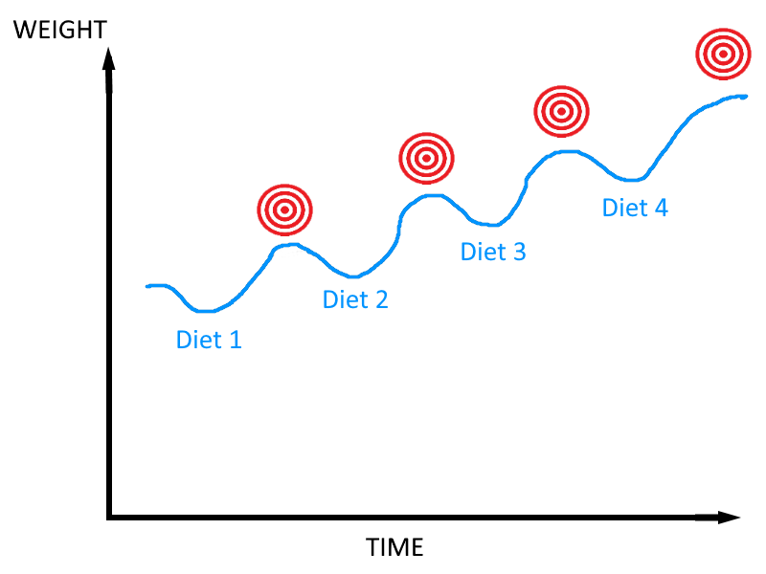Units 10 & 11 Horizon Business Village
1 Brooklands Road, Weybridge, Surrey. KT13 0TJ.8am - 6pm Weekdays
8am - 1pm SaturdaysWhy calorie counting does not work

Why calorie counting does not work
The standard exercise myth is that you will lose weight if you eat less and exercise more. That is true to a certain extent especially if you are eating significantly more than your required calories to begin with. But overall it is recipe for failure. Let us see why calorie counting does not work.
1st Law of thermodynamics
The first law of thermodynamics goes something like this:

Perfectly logical so far. ‘Energy in’ is easy, that is the food and drink that you ingest. ‘Energy out’ is quite a different matter. We think of energy out as exercise; something that is within our control. However, 70% of the energy we use daily is actually our Basal Metabolic Rate (BMR) which is not in our control. The other 30% of the energy we use daily is a combination of passive energy use (walking, fidgeting, cleaning) and active energy use (exercise).

Therefore, most of our energy expenditure is not in our control and is the reason why burning a few hundred calories in the gym makes little difference to our weight. In addition, for the rest of the day your body then tries to conserve energy. Read on and you will discover why it makes even less difference than you think.
What decides our obesity risk?
The popular misconception is that fat people are fat because they are lazy and eat too much. In fact, free will or personal choice only accounts for a small percentage of our weight. The obesity risk is:
- Hereditary predisposition (genes): 75%
- Free will: 15%
- Home environment / parental influence: 10%
That means that our genes account for most of our obesity risk. Everybody has a particular body type that we inherited, but a hundred years ago most people were a normal weight. Sure, people would come in a range of sizes but they would mostly be in the normal weight range. Fast-forward to the modern day and again we have a range of sizes but now two-thirds of people are in the overweight and obese range. The genes have not changed in such a short period of time. The only thing that has changed is our environment, especially our food environment, chronic lack of sleep and increasing stress.
BMI CALCULATOR
The ideal BMI is between 18.5 and 24.9 for most people.
1st law of thermodynamics is true only for machines
Let us put the energy in and energy out equation to the test.
If we eat 100 kcal more than we need each day (1 banana, or a few plain biscuits, or half a chocolate bar), then after 1 year we would have consumed 365 x 100 = 36,500 kcal extra.
1 Kg of fat = 7,000 kcal
So, we would expect to gain 36,500 divided by 7000 = 5.2 Kg of fat over a 1 year period.
Does that make sense to you? Let me put it another way. If we continue to eat 100 kcal extra for 5 years, then we would gain 26 kg. That is 57.3 lb or 4 stone 1.3 lb. Believe me when I say that does not happen and here is why.
The Vermont Overfeeding Study 1971
Prison volunteers, with the promise of an early release, were overfed in this experiment to reach a 25% increase in their weight over a 3 month period. At the start of the experiment they were eating around 2,200 kcal daily.
The scientists calculated that they would need to feed the prisoners approximately 3,000 – 4,000 kcal daily to help them achieve the 25% weight increase. In fact it took 8,000 – 10,000 kcal per day! Even then, many of the prisoners never managed to achieve the target weight whilst eating such a massive calorie load.
All the subjects returned to their pre-study weigh within 3 months after returning to their previous eating pattern.
A clue to why it took so many calories to achieve the weight gain comes from the observation that the prisoners were hot to the touch. They were literally burning up as their bodies ramped up their Basal Metabolic Rate to try and burn the extra calories. Their metabolic engines were running hot!
The Minnesota Starvation Experiment 1944
Another experiment performed earlier in the last century tried to study how the human body would cope with starvation. The Minnesota Starvation Experiment was performed in conscientious objectors who volunteered to make themselves useful during the Second World War.
The study subjects were fed a calorie-restricted diet of 1,500 kcal daily for 24 weeks. During this time, they lost an average of 25% of their body weight. However, their Basal Metabolic Rate dropped by 50%. Their heartbeat and breathing became slow and they were cool to touch as they had developed low body temperature. They suffered from depression, anxiety, hypochondria, poor concentration, and low libido. Unsurprisingly, they were preoccupied by thinking about food and especially fantasised about high calorie foods. Why would anyone want to this to themselves, but this is what dieters around the world do to themselves every day.
Refeeding of the subjects caused rapid weight gain and overshoot; i.e. they weighed more afterwards than they did to begin with. They lost muscle mass during their weight loss phase but this was never regained. The weight they gained was almost entirely fat.
It is surprising that this study is not more widely publicised. Low calorie diets are harmful. We have known this for more than 70 years. Why are NHS dieticians and diet companies allowed to propagate this disproven method of weight loss?
The weight set point
The two studies above highlight the important principle that the human body is very good at regulating itself, i.e. homeostasis. For example, we do not need to think about regulating the amount of fluid in our bodies. Our thirst mechanism takes care of our fluid intake, and our kidneys remove any excess.
In the same way, our brain has a weight set point which it tries to maintain. This is regulated through our Basal Metabolic Rate. As soon as we start overeating, our BMR speeds up to get rid of the excess. That is why the Vermont study subjects were hot to the touch; their BMR was high. When we reduce our calorie intake to less than we need, then the opposite happens and our BMR immediately slows down to conserve energy. This is why the Minnesota study subjects started feeling cold.
Just like any living organism, the survival instinct is powerful in human beings. Our bodies work hard to maintain homeostasis and try to overcome our efforts to cause imbalance. When we under-eat and lose weight this threatens our survival and our weight then rebounds afterwards. It then settles at a higher weight set point just in case we decide to starve ourselves again. During the weight loss and then weight regain, we lose muscle mass and gain fat. Our BMR, which relies on our muscle mass, then declines and we find it even harder to control our weight in the future.
The result of yo-yo dieting is a progressively higher weight set point and a body composition of more fat and less muscle that makes weight control difficult.

Hormones control our weight
Our weight is controlled, not by calories, but by the interaction of various hormones acting on the weight set point to maintain homeostasis. What disrupts this balance is the obesogenic environment that we live in. When body weight goes over a certain amount then we become insulin and leptin resistant and our brain becomes deaf to the signals that our hormones are trying to give it. We become permanently hungry despite our high intake of calories.
How to normalise weight
The calories in/calories out mantra has been going on so long that people cannot understand how they can possibly lose weight. Calorie restriction involves misery, going against our survival instinct and is unnatural. The best way to normalise weight is to target the weight set point.
That means:
- Stop counting calories; not only the ones we eat and drink, but also the calories we burn on the treadmill. Our bodies adjust our BMR immediately to conserve energy if we eat too little or exercise too much.
- Start thinking long term and not day-to-day. Any drastic cut in calories or over-exercising will be seen as a threat to your survival and will raise the weight set point for the future. The weight set point will take time to settle at a lower level, typically months or years depending on how much your weight is out of step with your optimal weight. You did not become overweight overnight and you will not reduce your weight overnight.
- Eat real food like people used to eat before the processed, high calorie, high sugar, high fat, high salt, and low fibre food revolution came around. Processed food disrupts your normal weight control mechanism. Your body has not evolved to deal with processed food in a healthy way yet.
- Sleep 8 hours per day. Lack of sleep increases insulin resistance, increases stress and raises your weight set point.
- Reduce stress. The stress hormone cortisol raises the weight set point.
- Your body is made to move. Tone your muscles with activities you enjoy (reduces cortisol and increases insulin sensitivity to reduce the weight set point). You do not need to run a marathon.
Some people may be at the point where their metabolism is completely dysfunctional and the will need the help of medication or weight-loss surgery to help them. That typically happens when the BMI goes over 30-35. Their bodies are telling them that they are always hungry despite getting more than adequate calories.
In all cases, it is best to seek the help of a clinician with an interest in obesity in order to get personalised advice and treatment.


